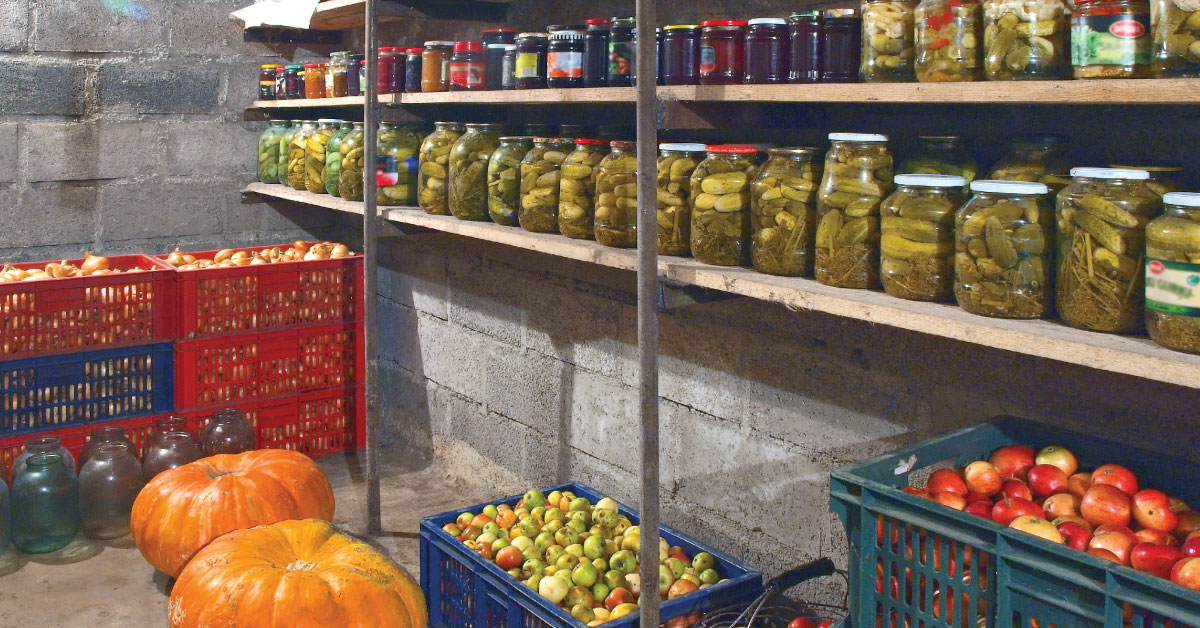
Home Preparedness
By David Coburn
I’ve taken this seriously enough that many friends have thought me a bit nuts. No matter, ensuring that my kids are provided for regardless of what the economy or nature brings has always just made sense. It was for this reason, in part, that I started our homestead. And while raising a family milk cow is not for everyone, there are plenty of measures that can be taken wherever you reside.
Water
Having potable water stored in jugs or buckets, in addition to what’s already in your water heater, is a basic way to provide for drinking and sanitation in the short-term without power. If you own a well, consider installing a hand pump to mitigate longer outages. A rain catchment system is also worth examination, as is a desalination kit along the coast. If surface water is your best option, it will need to be treated. Purification tablets are readily available, but keeping a filter such as a Big Berkey, a backpacking type or even a number of survival straws is simpler. In a pinch, regular old bleach can be used to purify water, but doesn’t maintain its effectiveness forever. Calcium hypochlorite (pool shock) is mentioned in a lot of survival blogs as an answer for shelf stable bleach. Though I have some, I would only use it in dire need because of chemical variations and additives. A crude emergency filter can be improvised with a bucket, some cotton sheeting, natural or activated charcoal and fine sand. You should always maintain the ability to treat water through boiling.
Food
Prepackaged meals and/or freeze-dried foods are great, but expensive. Hence, I put most of my emergency food reserves into lackluster non-perishables stored in food grade buckets: rice, dried beans, nuts, pasta, canned goods and wheat. Unground wheat berries deserve extra mention because they keep for a decade or two, can be cooked in an array of ways to be eaten whole or sprouted (as can other grains and lentils) to stave off vitamin deficiencies. And, of course, with a mill, wheat can be your source of flour for bread goods. Our pantry also has a notable amount of salt, sugar, and oils, such as coconut, olive, and ghee. If nothing else, a couple of big jars of peanut butter would guard against hunger for a while.
How about growing some of your own food? Cultivating a large garden is beneficial for both health and budget. Emergency gardens (sealed heirloom vegetable seeds) are available. If I only had space or time for one crop, potatoes are the ticket. The lowly spud provides tons of nutrition and calories for the effort and is adaptable to a variety of planting methods. Plant some fruit and nut trees/bushes and edible perennials now. With a little more exertion, you could try raising animals. Chickens (especially hens) and rabbits are fairly easy to care for, permitted in many municipalities and give a lot of return for the input. Hunting and fishing may be an option, but I do not think it prudent to count upon.
Warmth
I’ve installed wood stoves in my last two houses, and, though costly, I consider the investment well worth it. Kerosene burners are affordable auxiliaries. The antique Aladdin or Perfection parlor models can be attractive and are versatile enough to cook with. I’ve also hauled an old M-50 Yukon multi-fuel tent stove and piping from state to state for emergency use. If you have a large home, plastic sheeting could section off spaces to consolidate warmth. Cold weather sleeping bags and/or spare heavy blankets are also appropriate.
Security
If you can envision needing emergency stores, it’s not much of a leap to foresee desperate folks wanting to take them. I believe in voluntary charity, but forbear coercion and advise a means of safeguarding your family and reserves. As a free American, that means responsibly keeping at least one firearm. This missive is too short to wade into the sordid debate of what type, so for now I’ll leave it at that. Also, bad guys are often willing to work nights. Thankfully, night vision/infrared scopes are becoming increasingly affordable. An independently powered alarm system could not hurt (nor a dog), but I think it’s just as valuable to know and be on good terms with your neighbors.
Sanitation
Waste has to be dealt with, and for the past few weeks I’ve been grateful for a cache of toilet paper, though installing a bidet may be in our future. If it came to it, you can use a variety of natural materials or make washable tissue out of rags or cloth diapers. Dig a latrine or make a honey bucket then bury excrement in the ground away from water sources. Use ashes or lime to hold down the odor and flies, and keep plenty of soap on hand.
Information
You might not always be able to use the Internet. We utilize a quaint home library complete with literary classics, medical and homesteading references, maps of the area and even an old encyclopedia set. A very short list of books I recommend as references germane to this discussion includes: “The Encyclopedia of Country Living,” “Where There Is No Doctor,” “The Ball Blue Book of Preserving,” and “Gardening When It Counts.” I also entreat you to find a credible field guide to wild plants and herbs specific to your region and, of course, a Bible.
Additional Thoughts
An alternative means to prepare food and boil water is a must. This can be as simple as an outdoor grill or camping stove with extra fuel. Alcohol-fired penny stoves and wood-burning rocket stoves can be fashioned easily from scrap materials. Having enough of the right tools can make all the difference, and I’ve learned to appreciate a large shop. Backup generators are popular, but I have yet to invest in one. I do keep a solar charger (with rechargeable batteries) for small devices, and am intrigued by thermoelectric chargers. A well-supplied medicine chest, complete with extra pain relievers, fever-reducers, disinfectants, bandages, required medications and some basic instruments could be vital. A large amount of cash tucked away and some items for trade are a sound notion. Ideas for bartering include: extra supplies, coffee, alcohol, tobacco and ammunition. What are your transportation needs? Perhaps a few bicycles are in order or some extra gasoline with stabilizer? Think about getting in better physical health now.
Being prepared is not just about stockpiling stuff. To summarize a Jordan Peterson lecture, “Something that is worth doing, is worth doing badly.” The first time I attempted countless things from raising chickens to hovering a helicopter, I failed miserably. Many abilities take experience to even perform marginally, but you’ll never get there if you don’t start. Cooking, food preservation, first aid, mechanical repairs, etc. are all worthwhile pursuits, but waiting until you are under duress to try and learn is foolhardy. We all have lives to live and I don’t think it’s wise to hole up in an isolated underground bunker for the sake of what “might” happen. Nonetheless, I’d rather be thought a little daft by friends than see my family suffer for want of a little foresight or effort.




Right on! One of the folks in Salt Lake City, where I live and worked, said: “You Mormons and your food storage plans are crazy, I’ll just go the nearest ATM and get all the money I need.” BTW, a New York transplant form Long Island…need I say more?